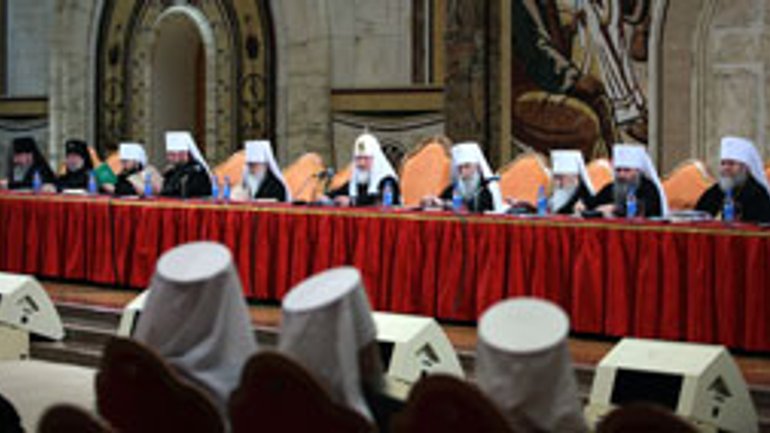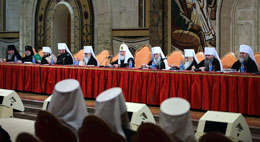Russian Church’s Bishops Stress Need to Enhance Interaction between Church and State Authorities on its Canonical Territory

 MOSCOW — On February 2, 2010, a meeting of bishops of the Russian Orthodox Church (ROC) was held in Moscow. They came to Moscow on the eve of the first anniversary of Patriarch Kirill’s enthronement. On February 1, over hundred bishops, including members of the synod participated in the Divine Liturgy in the Cathedral of Christ the Savior celebrated by the primate of the Russian Church.
MOSCOW — On February 2, 2010, a meeting of bishops of the Russian Orthodox Church (ROC) was held in Moscow. They came to Moscow on the eve of the first anniversary of Patriarch Kirill’s enthronement. On February 1, over hundred bishops, including members of the synod participated in the Divine Liturgy in the Cathedral of Christ the Savior celebrated by the primate of the Russian Church.
Patriarch Kirill proposed to translate and spread church documents and his messages into languages of countries located on Moscow Patriarchate canonical territory. The Moscow Patriarch believes that believers of the countries included in the Moscow Patriarchate should be able to easily understand the Church’s basic documents.
“I believe it extremely useful for strengthening church unity to spread liturgical, catechetic texts, and the most important documents of the Russian Orthodox Church, including patriarchal messages, in basic languages of peoples in its jurisdiction,” Patriarch Kirill said on Tuesday at the Bishops’ Meeting in the Cathedral of Christ the Savior. The decision was passed by the bishops.
Also, according to the web site of the head of the ROC, the bishops stressed the importance of “further unification of the general civilization space of Russia and cooperation in this regard with the state structures and public organizations of all the countries where the ROC is represented.”
A separate resolution of the meeting deals with the need to strengthen the interaction of the ROC with the state authorities in the countries of the “canonical space and diaspora,” especially to enable the rapid passing of legislative and by-laws regulating the return to the church of “property that was unjustly taken away from it.” The participants gave their blessing for the establishment of departments on relations between the church and society or appointment in each eparchy of persons responsible for these relations for each eparchy.
The meeting was attended by 151 bishops including representatives of the Ukrainian Orthodox Church-Moscow Patriarchate and heads of synodal departments of the Moscow Patriarchate.









